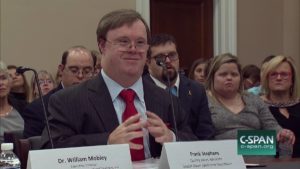I’m a lucky man. I was born in the United States in the second half of the 20th century. If I had been born in any one of many other countries, or even here a generation earlier, my life would likely have been short and unhappy.
You see, I’m a man who happens to have Down syndrome. In this time, in this country, my life has value. I’m allowed, even invited, to testify to a congressional hearing. Thank you, Chairman Tom Cole and Ranking Member Rosa DeLauro.
In other countries, like Iceland and Denmark, medical practitioners strongly encourage women to terminate pregnancies when there is a Down syndrome diagnosis. These nations spend very little, if anything, on research, and some of their leaders even proclaim their countries should be “Down syndrome free by 2030.”
That makes me sound like a pesticide or a fossil fuel.
I’m lucky I live here, where I am valued and where I get to tell my government what I think. I testified recently in support of more National Institutes of Health funding for Down syndrome before the House Appropriations Subcommittee on Labor, Health and Human Services, Education, and Related Agencies.
While I feel lucky, I am concerned about the next generation of people like me and the amount of money our government provides for this research.
The NIH estimates that it will spend $21 million on Down syndrome research this year, $7 million less than in fiscal year 2017 and less than at any point since fiscal year 2014. Funding will drop even though the number of people with Down syndrome in the United States has increased. As the Centers for Disease Control and Prevention notes, Down syndrome is still the most common chromosomal disorder and, annually, about 6,000 babies are born in the United States with it.
I worry that falling spending sends a message that our government soon will go the way of Iceland and Denmark. If our government no longer thinks funding Down syndrome is worthwhile, how long before it thinks my life is no longer valuable?
If money equals support, then I’m worried.
This isn’t just about Down syndrome. Advances in biomedical technology are not going to stop at screening for Down syndrome. It won’t be long before we can identify all manner of medical or personality “deviations” in the womb. As a society, we should consider the ethics of all of this. Our choices today tell us about the ones we might have to make in a few years.
For those who still doubt our value, I’ll spell it out.
First, as I told the House subcommittee, I have a great life. I’ve been a guest lecturer at major universities. I’ve contributed to a best-selling book, had a feature role in an award-winning film, guest starred on an Emmy winning television show, and have spoken to thousands of young people about the value of inclusion. I’ve received the Quincy Jones Exceptional Advocacy Award from the Global Down Syndrome Foundation.
I’ve even been to the White House twice. And I didn’t have to jump the fence either time.
A Harvard study found people with Down syndrome and their families are happier and more stable than most people.
If that still doesn’t convince readers, maybe this will. Because of what we now understand about Down syndrome, we know that studying this condition offers insight into some of medicine’s most confounding disorders and diseases.
Take Alzheimer’s, which is slowly stealing my Mom from me. Because we know that people with Down syndrome are highly likely to develop early onset Alzheimer’s, my extra chromosome provides a blueprint for medical research that could reveal answers to this heartbreaking disease.
I’m not a research scientist, so I’m not going to try to explain the details, but it’s not just Alzheimer’s. Research into Down syndrome also can help unlock what causes things like cancer, Celiac disease and Type 1 diabetes. There are 300,000 individuals in the United States living with Down syndrome today. There are millions living with those illnesses.
An extra dollar for Down syndrome research will pack a two-for-one, or even three-, or four-, or five-to-one punch if it helps crack the code to other medical mysteries.
If for no other reason than that, I hope we remember that we are America, not Iceland or Denmark. Our goal should be Alzheimer’s free, not Down syndrome free.


